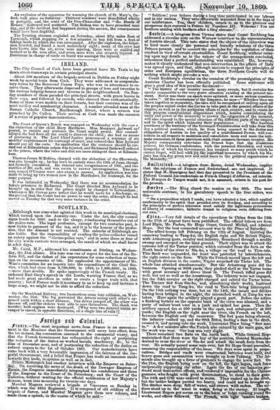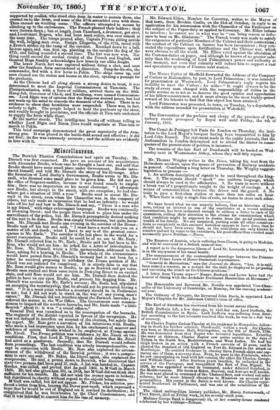foreign unit Cainuial.
trEnr?.—The most important news from France is an announce- ment in the lifoniteur that the Government. will carry into effiiet; from the let instant, the convention annexed to the commercial treaty, 'mad that the French Government has relinquished the right of postponing the reduction of the duties on worked metals, machinery, &c., to the 31s1 of December next, and of postponing the reduction of the dutiee on refined sugars to the 1st of October 1861. Our manufacture's have come back with a very favourable impression, of the fairness of the *Im- perial Government, and a belief that France has made an immense stride towards free trade, in opinion as well as in. fact..
Prince Metternich bed another interview with the Emperor on Satur- day. On receiving the news of, the death of the Dowager Empress of Russia, the Emperor immediately telegraphed his condolences and those Qf the Empress to the Court of St. Petersburg; and the Court of the Tuileries, without waiting for the official notification of her Majesty's decease, went into mourning for twenty-one days. Marshal Magnan reviewed a brigade at Vincennes on Sunday in which was the 103d Regiment. It is composed of old soldiers of the brigade of Savoy, and Marshal Magnan gave them new colours,, and made them a speech, in the course of which he said-
" "Soldiers your fathers deritklt a long time participated in our labours and in our Sumess. They were a erwards separated from us in the days of our misfortunes. You, their children, return to us in the glorious and prosperous days restored to France by Napoleon III. Welcome ! You are brothers uniting with brothers after a long absence."
instria.—A telegram from Vienna states that Count Rechberg has addressed a circular note on the Warsaw interview to the representatives of Austria abroad. This note states that the object of the interview Was to bind more closely the personal and friendly relations of the three Princes present, and to concert the principles for the regulation of their conduct in view of certain eventualities. Count Rechberg, without enter- ing upon any details as .to the nature or the arrangements concluded, announces that a perfect understanding was established. He, however, makes it clearly understood that non-intervention in the affairs of Italy was Agreed upon, and that, although anxious to support the principles of order and European equilibrium, the three. Northern Courts will do nothing which might provoke. a war. Count Rechberg's circular on-the occasion of the promulgation of the Austrian Charter has been officially published. Some sentences will give a good idea of this peculiar-decument-
t" The-history of our country records many events, but ie contains few epoohs comparable to the very grave situation existing at the present mo- ment. Never was there an epoch more agitated, or more serious questions to solve." Of the resolutions of the Emperor, be says—" Whether they are taken together or separately,, the idea will be recognized of calling upon all the peoples, united under the Crown to take part in the general affairs of the empire, as well as ip.the particular affairs of each. country, and to create for this purpose constitutional dispositions which, betides consolidating the unity and power of the monarchy to answer the exigencies of the moment, will also respond tells special situation of the different parts of the empire, and to the spirit which animates their.Populations. . . . . The Austrian provineee of the territerpof the GermanteVonfederation will take from this deyy a political position, which, far from being opposed to the duties and obligations of Austria in her quality of a confederated Power, will con- tribute in. all respects to maintainand'consolidate more and more the inti- ,meW eceinexion,04thoes provincee with:their common German country. His Majesty consequently entertains the firmest hope that tbe illustrious princes, his German confeapearps with the personal friendship and warm sympathy of which his Government has received so many proofs which be cannot forget, will hail with pp tu. inwoittult, measures by which his Ma- eety has thiselass given new and essIsd Some to the political organization of he Menittichse" !.s 0,1141,41U 11111.—A telegram from Berne,..datml Wednesday, implies time the relations of: France and Switzerland are not-improved. It states that X..Massigliao had that day-presented to the President of the Federal CouneiLhiaceedentials as French Chargé d'Affaires, ad interim. The peMrest'atquis de Turgot. would mot, it is assumed, return. to his post for the eth!! .—The King closed the session on the 30th. The most noticeable sentence, in his gratnlatory speech to the four orders, was this-
" On a proposition which I made, you have adopted a law, which applied conformably to the spirit that presided over its wording, and according to the principles of perfect tolerance must satisfy the legitimate pretensions of liberty of conscience, hitherto denied to religious sects differing from our own."
tV11111 8.—Very- full details of the operations in China from the 12th to the 27th of August have been published. The official letters are from Lord'Elgin, Mr. Parkes, Sir Hope Grant, General Michel, and Admiral Hope. Nit the best connected account was in the Times of Saturday.. The allied troops left Pehtaug on the 12th of August. Quitting the causeway leading to Tang-ku, the English right and Sir Robert Napier, with Armstrong guns, cavalry and.infantry, floundered through a muddy swamp and emerged on the herd ground, Their object was to attack the extreme left-of the Tartar position, which extended from the forts on the North bank of the river to Sin-ho a village on the road to Tien-tsin. This flank was unguarded, the front was protected by intrenchments, the right rested on the forts. While theErench moved upon the left and an English division in the centre, Napier surprised the Tartar left. The whole line attacked simultaneously. But- the Arinstrong guns did the business. Opening at 2000, yards; they pitched shell at the Tartar horse with great accuracy and drove them in. The French rifled guns did well, but not so well as the .Armstrongs. The infantry were not engaged, but the sack cavalry on the right charged and sabred the Tartar horse. i'The Tartars fled from Sin-ho, and, abandoning their works, hastened ' down the road' to Tang-ku, the road to Tien-fain being intercepted. On the 13th nothing was done, but on tIse-14th, the canals and ditches - having been bridged in the night, the intrenched work at Tang-ku was taken. Here again the artillery played a great, part. Before the action a flanking battery on the opposite bank of the river was silenced, and a party of sailors went over in. a junk and spiked her guns. Then the artillery opened fire at 600 -yards in the open, and subsequently- at 350 yards ;• the English on the right near the river, the French on the left, between the English and the causeway. The fort guns being silenced, the infantry rushed up, and the 60th Rifles, finding a dam in the ditch, enassed it, and sprang into the work, Lieutenant Shaw being" first man in." A few minutes after the French also entered by the main gate, and ' the work was won. Our loss was very slight. There remained two forts on the north bank. While General Hope maintained that these were the key of the position, General Montauban desired to cross the river at Sin-ho and attack the south forts from the rear. He actually passed some men over, but Sir Hope Grant prevailed, assuming the responsibility of the issue. Six days were spent in prepa- int:lens. Bridges and roads were constructed, batteries were built, and heavy guns and ammunition were brought up from Peheang. The Ad- mirals also brought up a force of gunboats to engage, the lower fort. On the 21st, the English being now on the left, the tight began, each force reciprocally supporting the other. Again the fire of our bAteries pro- ' dueed most destructive effecti, and rendered it impossible for the Chinese gunners, who fought with great determination, to stand to their guns. The 44th and 67th were ordered to storm. They rushed up to the ditch, but the ladder bridges proved too heavy, and could not be brought up. The ditches were deep, full of water, and strewn with stakes. The sol- diers stood up to the waist in water, firing at the enemy. At length, Lieutenant Rogers got across on to the berm or ledge running round 'the works, and others followed. The French, with light bamboo bridges, supported by coolies, who stood chin deep in water to sustain them, also crossed on to the berm, and some of the 67th scrambled over• with them. Then ensued an exciting scene. The officers attempted to mount by climbing up to the embrasures. The Frenchplanted their ladders ; they were thrown down ;: but at lougth Jean gauc*d, a drummer, got qver, and. Lieutenant Rogers, who hiel been moat active, was, over almost at the same time. The troops pewit after, Captain Frynee sitting astride the wall, helping men over, Ensign. Chaperiii, of the 67th, raced.with a French soldier up the ramp of the cavalier. Enoeked down by a, he rose again and, was first up, planting on, the eavaliee the flag of the 67th, and .falling wounded a second time. The fort was now won, Noe thing could exceed the cordial rivalry of- the French and English, and General Hope frankly acknowledges how bravely our allfes fought.
The lower North fort was captured without firing a. shot, and soon Item! the. Southern fort* surrendered at discretion. Sang-ho-linain, the
commander, fled with a few horse to Pekin. The. ships came up, and soon cleared out the stakes and booms in tho,river, opening a passage for the gunboats,
As the Chinese had all along shown a strong desire to treat, it was determined to meet the Imperial Commiasionors at Tien-Min. The
Plenipotentiaries, with a force of soldiers, arrived there on the 26th.
Hang-fuh, Governor of Chili, and Kweiliang, were named Commission- ers. Lord Elgin was of opinion that the Emperor desired peace, but had not made.up his mind to concede the demands of the Allies. There is no evidence to show that -hostilities were suspended. There was, in fact, nobody to fight. The people helped to haul the gunboats up the river, and readily brought in provisions, and the, officials at Tien-tain undertook to supply the force while there.
So the matter stands. The intelligence breaks off without telling us, whether Lord Elgin and. Baron Gros would negotiate at Tien-Min or march to Pekin.
This brief campaign demonstrated the great superiority of the Arm- strong gun. It was placed in the battle-Aeldsound and effective; it did not foul; its fire was extremely accurate ; an& the soldiers are evidently in love with it.



























 Previous page
Previous page